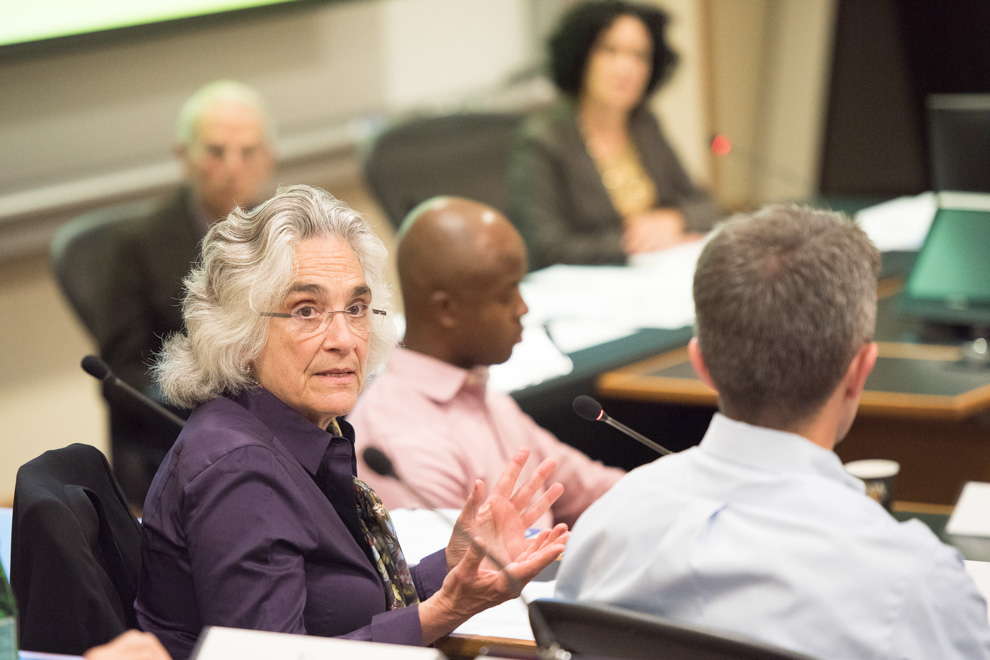In light of a student-government report calling for sexual violence policy reform, Provost Persis Drell told the Faculty Senate that the University cannot currently make any changes to its sexual violence adjudication policies due to an agreement made in 2018 with the Office of Civil Rights (OCR).
“We’re stuck,” she said. “There is a current issue with the Office of Civil Rights, and we are not able to make any changes to our policy right now.”
In the spring of 2018, OCR, a division of the Department of Education focused on enforcing civil-rights laws, concluded a three-year inquiry at Stanford that found that the University was not in compliance with Title IX in two respects, including that the Student Title IX Process included an “incorrect standard” for addressing concerns related to retaliation.
The University reached an agreement with Office of Civil Rights that commits Stanford to make changes to its policies, and requires the University to “provide any substantive modifications” to the revised policies “at least 90 days before the University proposes to adopt the modification to ensure consistency with this Agreement.”
Drell told the Faculty Senate that several modifications to Stanford’s sexual assault policies are currently awaiting approval from the OCR.
“Changes that OCR requested that we make as part of their investigation have not been acted on,” she said. “They have not been approved, and then there are a series of requests behind that that we’ve also put in which have not been acted on.”
Comparative literature professor David Palumbo-Liu expressed his concern that the “OCR … under Betsy DeVos is in shambles.” He further criticized Candice Jackson, the government official in charge of enforcing federal sexual assault policy, who told The New York Times that 90% of sexual assault accusations “fall into the category of ‘we were both drunk,’ ‘we broke up, and six months later I found myself under a Title IX investigation because she just decided that our last sleeping together was not quite right.” Jackson later clarified that her conclusion was based on feedback from accused students, and “all sexual harassment and sexual assault must be taken seriously.”
Thursday’s meeting follows the release of a report on sexual violence prevention by the Associated Students of Stanford University (ASSU), which was unanimously endorsed by both the Undergraduate Senate and Graduate Student Council. The report cited a lack of trust between students and administrators, and called for broad changes to University policy.
In a letter to the Stanford community, ASSU President Erica Scott ’20, Vice President Isaiah Drummond ’20 and Chief of Staff Remy Gordon ’20 claimed that “a concerning lack of trust between students and professional staff” exists due to “Stanford’s historical inaction in cases of sexual violence and harassment” which has continued to worsen due to “poor communication and the persistence of troubling policies.”
The report called for the removal of “administrators who are most resented and attempt to re-build trust for others.”
Students at the Faculty Senate meeting sought to emphasize the nature of “confusing, overlapping” and “distributed” survivor care services at Stanford which “lack clear entry points.” Emma Tsurkov, a fourth-year sociology Ph.D. student and ASSU co-director of sexual violence and relationship abuse prevention, told the Senate that “there should be a good and straightforward process to decide on such complaints,” and that the current process “is far from being straightforward.”
The report also underscored the importance of legal aid for survivors assaulted by both students and faculty. Under Stanford’s current protocol, complainants accusing students of misconduct go through the Student Title IX process, which entitles them to University-paid legal counsel. Those bringing complaints against faculty and staff undergo a different process.
“Let’s say I’m on the sailing team,” Tsurkov said. “If I get harassed by a fellow student who is also with me on the sailing team, I get nine hours of lawyer time. If I get harassed by the coach, I don’t.”
“Lawyers in this case are crucial in understanding and navigating the process,” she continued.
Drell did not commit to legal representation for students harassed or assaulted by faculty members.
“It’s a totally different process,” she said. “That student does not have to write statements or make evidentiary challenges. The school plus Title IX take on that role of investigating what has gone on and making a recommendation.”
The report also proposed the creation of an Office of Survivor Advocacy (OSA) to create a supportive “single entry point into care” for survivors and consolidate the many resources Stanford already offers. In response, Drell referred to the expansion of the YWCA Sexual Assault Center.
“We are looking forward to very soon announcing further YWCA services for our students on campus” she said.
Students and faculty alike called for increased sexual harassment prevention training, and Drell committed to working with students to extend training with an emphasis on the “bystander upstander” approach.
“We can and should do more in the training of our students, particularly undergraduates, given that 80% of the incidents of sexual violence on our campus are student on student,” she said.
Drell also publicized an upcoming two-day campus event focused on mental health, called “Community Conversations on Mental Health.”
Senator Jonathan Lipman ’21, the lead author of the report, told The Daily after the meeting that he was “glad that Provost Drell thought the report contained many excellent ideas, but as she alluded to during her presentation, it’s not enough to care; action is needed.”
Contact Emma Talley at emmat332 ‘at’ stanford.edu.
